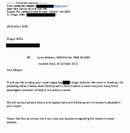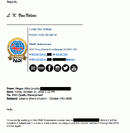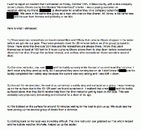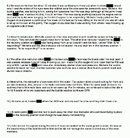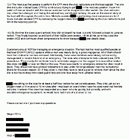I've been a member of this board for quite a while and rarely post, but in this case I'd like to contribute. I go to Maui every year for 5 or 6 weeks and I do a lot of diving while I'm there. I have gone out with Makena Coast (remember them?), Mike Severens, Ed Robinsons, B&B, and Lahaina Divers. The vast majority of my dives are with LD (probably around 200) because I live up in Lahaina while I'm on the island. I've been on the boat with Meaghan and Levi and Erica and likely the other personalities contributing with knowledge on this thread.
If I look at this from an accident avoidance perspective, the OP seems to suggest that this example can be avoided by either avoiding the site (too dangerous) or avoiding the Dive Op (too poorly trained or unprofessional to help). There is not enough information provided to even begin an assessment of the root cause, so it's all after the fact.
On the 2 points - Is the site dangerous? I've done that site approx 10 times. The channel is famous for rough water and often it's unpredictable. It is rough most of the time and sometimes calm. This is well publicized. The crossing can make you sea sick sometimes but not always. Sometimes the crossing is rough but the area around the rock (dive site) is calm. The LD boats are very large and can safely take water conditions that many cannot. I have been at the dock when they have cancelled the trip, so it's definitely not "guaranteed" like a bus schedule. In high waves, the retrieval process can be challenging, but they have a very well rehearsed process with a tow line and if you can follow the instructions and not panic while you bob and stay calm (part of my definition of an advanced diver) it works.
There is sometimes some current there, but honestly, the most exertion I have experienced on a Lahaina Divers trip was last year at Shark Fin where we got blown off the reef and away from the boat on the backside of Lanai. That site is one of their "non-advanced" sites. Currents happen and advanced divers are prepared for them. So, do I call the site "dangerous"? No, it's a site with some current sometimes and a challenging pickup sometimes - would I avoid it because a fatality happened there? No, because I don't know enough about this fatality to determine if the site had anything to do with it.
Is the dive-op dangerous? LD has been around for a very long time. They haul a very large amount of divers out to sea every year. I think that in the dive industry, there is a type of quiet that surrounds accidents in tourist locations, however this forum usually gets it right and people talk. Based on that and what I've seen on board they have an excellent safety record.
I've seen it mentioned before, but it raises the question of what we expect out of our boat crews. This was a diver is clear distress after the dive. We don't know what caused it, but he's (I assume it's a he) in dire straits. People have to respond and do the best that they can. In our society we train people to be able to respond to emergencies. Some we pay and others we don't but rely on citizenry to help out. In boat crews we expect friendly helpful people to run around and get us the proper weight, tell us about the fish we will see, tell us where the life jackets are and how to get on and off the boat. Then we ask them to swim around with us and show us stuff. In the back of their minds we expect them to be trained and ready in case of an emergency to save our asses.
To me, I can relate them to a crew on an airplane. They look like service personnel, but if something goes wrong, they spring into something completely different and are in charge. The difference? The pay. Dive professionals are often young people who have had a few courses and hopefully translate that into action when the adrenaline starts to flow. Under the great test, some will do better than others, but I don't expect my divemaster to be my saviour. It would be nice, but I don't expect it. I expect that they will do the best they can. In my experience with LD, I have seen this perhaps 3 times, where either a diver is unaccounted for or something else and suddenly the crew is not the friendly fish-finders they were a few moments ago. I had no complaints about how they react.
I might die on a dive boat, actually as a diver ...... that's kind of the way I hope to go (although it will be a bad day for poor staff on the boat). I may die on a golf course or sitting in front of the TV. In the OPs description of the crew's reaction, like other posters, I don't see much wrong. I see a flurry of activity around a victim, some of which is incorrect. The more senior person with the most competence took over and managed the scene. The crew member that made an error and tried to roll the victim over was corrected - I don't believe that any harm resulted.
In the case of the CCR diver(s), I've been there when they've picked up Bob. If one of the crew (Joe) was able to get down to them to find out that they had a 34 minute deco load, then he could also have communicated that the boat was heading back to harbour and to stay down close to the rock. All the instructors on those boats have slates. That's one option. If I were the captain however, I don't think I would make that call. I think I would do exactly what was described - wait for the coast guard. It all has to do with assessing the risk/benefit. We don't know how far gone the victim was, but I suspect very far. Either way, it's a horrible choice to have to make and I feel for him (her). Bob (the CCR diver) goes out almost every trip. People are told to stay away from his gear and he goes in solo (usually) and has limited interaction with crew or other divers. As a company would I allow this? Probably not for exactly this reason, but it's the easiest most convenient way for him to get to this site and he profits for his shop. I agree that you can't just blow someone's deco with a diver recall for the tech divers. They would be perfectly safe hanging out in the shelter of the rock at a shallow depth as long as they knew what was happening.
Bottom line for me, I don't find any fault with the company, am assuming that the diver probably would have had this issue at any site and my heart goes out to the staff who likely did the best they could in a normal day turned horribly wrong and probably still have the "what else could I have done" questions that all first responders have. If the company is professional, I expect that they will have an incident review process where they break the whole thing down to determine whether there is anything they can change in their standard practices. As a diver, I recognize that if I book the Molokai trip, its a long bumpy ride to a site where too many times I've seen only a bunch of little fish and that I'm a long way away from help. I accept that.
Maybe I should post more - I seem to have had a lot in me. Sorry.




